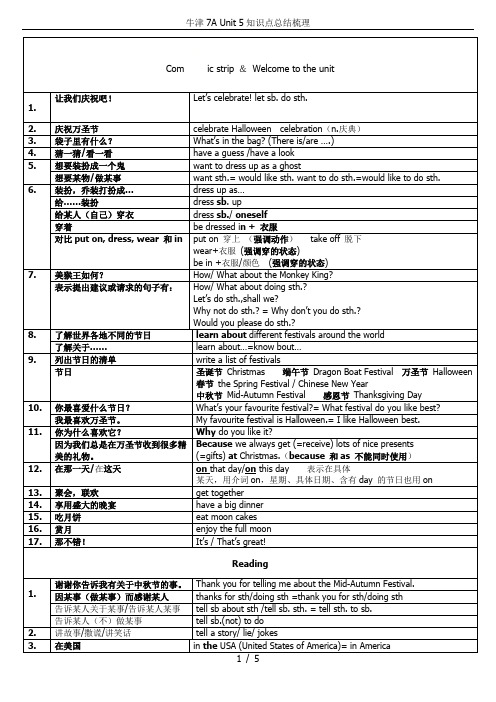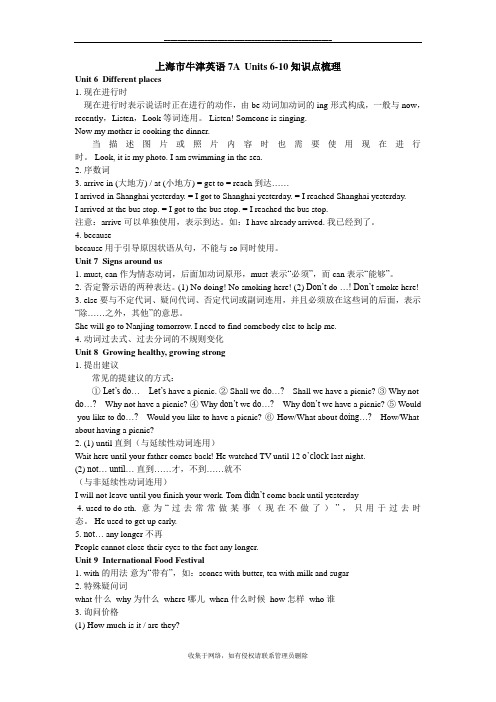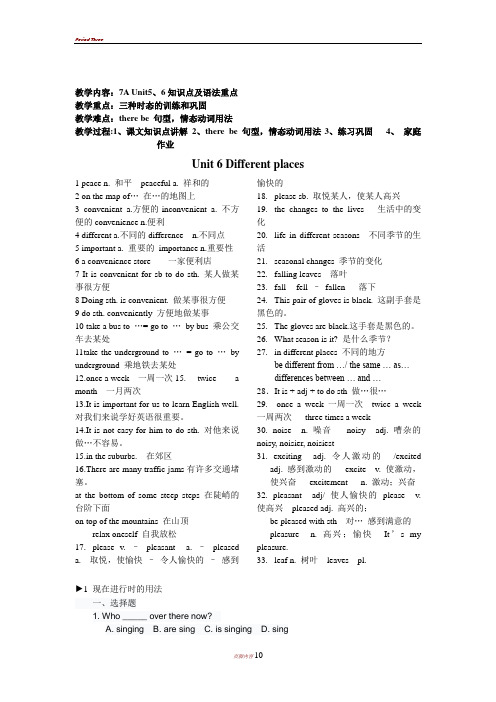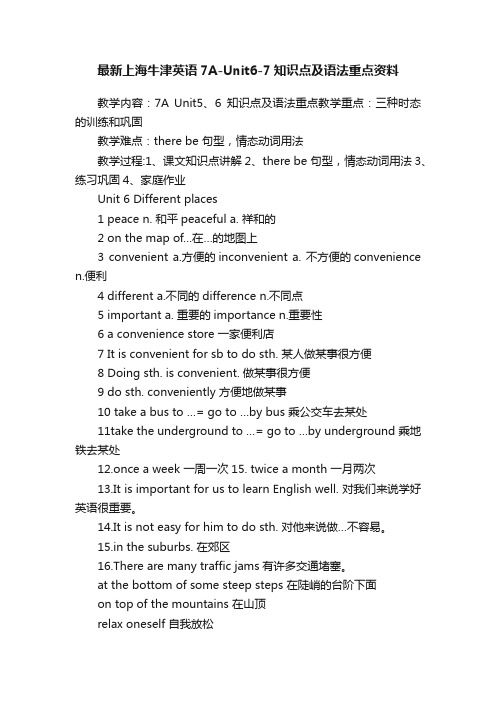上海牛津英语7A Unit5、6知识点及语法重点
牛津7A Unit 5知识点总结梳理

Com ic strip &Welcome to the unit1.让我们庆祝吧!Let’s celebrate! let sb. do sth.2.庆祝万圣节celebrate Halloween celebration(n.庆典)3.袋子里有什么?What’s in the bag? (There is/are ….)4.猜一猜/看一看have a guess /have a look5.想要装扮成一个鬼want to dress up as a ghost想要某物/做某事want sth.= would like sth. want to do sth.=would like to do sth.6.装扮,乔装打扮成…dress up as…给……装扮dress sb. up给某人(自己)穿衣dress sb./ oneself穿着be dressed i n + 衣服对比put on, dress, wear 和in put on 穿上(强调动作)take off 脱下wear+衣服(强调穿的状态)be in +衣服/颜色(强调穿的状态)7.美猴王如何?How/ What about the Monkey King?表示提出建议或请求的句子有:How/ What about doing sth.?Let’s do sth.,shall we?Why not do sth.? = Why don’t you do sth.?Would you please do sth.?8.了解世界各地不同的节日learn about different festivals around the world了解关于……l earn about…=know bout…9.列出节日的清单write a list of festivals节日圣诞节Christmas 端午节Dragon Boat Festival 万圣节Halloween春节the Spring Festival / Chinese New Year中秋节Mid-Autumn Festival 感恩节Thanksgiving Day10.你最喜爱什么节日?What’s your favourite festival?= What festival do you like best?我最喜欢万圣节。
最新上海市牛津英语7A

上海市牛津英语7A Units 6-10知识点梳理Unit 6 Different places1. 现在进行时现在进行时表示说话时正在进行的动作,由be动词加动词的ing形式构成,一般与now,recently,Listen,Look等词连用。
Listen! Someone is singing.Now my mother is cooking the dinner.当描述图片或照片内容时也需要使用现在进行时。
Look, it is my photo. I am swimming in the sea.2. 序数词3. arrive in (大地方) / at (小地方) = get to = reach 到达……I arrived in Shanghai yesterday. = I got to Shanghai yesterday. = I reached Shanghai yesterday.I arrived at the bus stop. = I got to the bus stop. = I reached the bus stop.注意:arrive可以单独使用,表示到达。
如:I have already arrived. 我已经到了。
4. becausebecause用于引导原因状语从句,不能与so同时使用。
Unit 7 Signs around us1. must, can作为情态动词,后面加动词原形,must表示“必须”,而can表示“能够”。
2. 否定警示语的两种表达。
(1) No doing! No smoking here! (2) Don’t do …!Don’t smoke here!3. else要与不定代词、疑问代词、否定代词或副词连用,并且必须放在这些词的后面,表示“除……之外,其他”的意思。
She will go to Nanjing tomorrow. I need to find somebody else to help me.4. 动词过去式、过去分词的不规则变化Unit 8 Growing healthy, growing strong1. 提出建议常见的提建议的方式:①Let’s do…Let’s have a picnic. ② Shall we do…? Shall we have a picnic? ③ Why not do…? Why not have a picnic? ④ Why don’t we do…? Why don’t we have a picnic? ⑤ Would you like to do…? Would you like to have a picnic? ⑥ How/What about doing…? How/What about having a picnic?2. (1) until 直到(与延续性动词连用)Wait here until your father comes back! He watched TV until 12 o’clock last night.(2) not…until…直到……才,不到……就不(与非延续性动词连用)I will not leave until you finish your work. Tom didn’t come back until yesterday4. used to do sth. 意为“过去常常做某事(现在不做了)”,只用于过去时态。
上海牛津英语7A_Unit6,7知识点及语法重点

教学内容:7A Unit5、6知识点及语法重点教学重点:三种时态的训练和巩固教学难点:there be 句型,情态动词用法教学过程:1、课文知识点讲解2、there be 句型,情态动词用法3、练习巩固4、家庭作业Unit 6 Different places1 peace n. 和平peaceful a. 祥和的2 on the map of…在…的地图上3 convenient a.方便的inconvenient a. 不方便的convenience n.便利4 different a.不同的difference n.不同点5 important a. 重要的importance n.重要性6 a convenience store 一家便利店7 It is convenient for sb to do sth. 某人做某事很方便8 Doing sth. is convenient. 做某事很方便9 do sth. conveniently 方便地做某事10 take a bus to …= go to …by bus 乘公交车去某处11take the underground to …= go to …by underground 乘地铁去某处12.once a week 一周一次15. twice a month 一月两次13.It is important for us to learn English well. 对我们来说学好英语很重要。
14.It is not easy for him to do sth. 对他来说做…不容易。
15.in the suburbs. 在郊区16.There are many traffic jams有许多交通堵塞。
at the bottom of some steep steps 在陡峭的台阶下面on top of the mountains 在山顶relax oneself 自我放松17. please v. –pleasant a. –pleaseda. 取悦,使愉快–令人愉快的–感到愉快的18. please sb. 取悦某人,使某人高兴19. the changes to the lives 生活中的变化20. life in different seasons 不同季节的生活21. seasonal changes 季节的变化22. falling leaves 落叶23. fall -- fell –fallen 落下24. This pair of gloves is black. 这副手套是黑色的。
七年级英语7A Unit1-Unit5主要知识点复习上海牛津版知识精讲

七年级英语7A Unit1-Unit5主要知识点复习上海牛津版【本讲教育信息】一、教学内容:7A Unit1-Unit5主要知识点复习二、知识总结与归纳Module 1 (Unit 1- Unit 3)1. invite sb. to do邀请某人做某事He has invited us to stay with his family in Beijing.他已经邀请我们去北京和他的家人呆在一起。
2. travel to 旅行去……We usually travel to some small cities.我们经常去一些小城市旅游。
3. more interesting 更加有趣more beautiful 更加美丽more exciting 更加激动人心4. talk to 和……谈话Let’s talk to Mum and Kitty.让我们去和妈妈还有基蒂谈谈。
5. travel agent 旅行经纪人I’ll get some brochures from the travel agent.我会从旅行经纪人那里拿到一些宣传手册。
6. How long does it take to…? ……花费多少时间?It takes (time) to do ………花费(时间)How long does it take to get to Beijing?到北京花费多少时间?It takes about 2 and a half hours to get there.到北京大概要花费两个半小时。
7. come back 回来We’re going to come back at 8.我们将会在8点回来。
8. at the end of (August) 在(八月)底We will start school at the end of August.我们将会在八月底开学。
9. thank sb. for 为……谢某人Thank you for your water. 谢谢你的水。
最新上海牛津英语7A-Unit6-7知识点及语法重点资料

最新上海牛津英语7A-Unit6-7知识点及语法重点资料教学内容:7A Unit5、6知识点及语法重点教学重点:三种时态的训练和巩固教学难点:there be 句型,情态动词用法教学过程:1、课文知识点讲解2、there be 句型,情态动词用法3、练习巩固4、家庭作业Unit 6 Different places1 peace n. 和平peaceful a. 祥和的2 on the map of…在…的地图上3 convenient a.方便的inconvenient a. 不方便的convenience n.便利4 different a.不同的difference n.不同点5 important a. 重要的importance n.重要性6 a convenience store 一家便利店7 It is convenient for sb to do sth. 某人做某事很方便8 Doing sth. is convenient. 做某事很方便9 do sth. conveniently 方便地做某事10 take a bus to …= go to …by bus 乘公交车去某处11take the underground to …= go to …by underground 乘地铁去某处12.once a week 一周一次15. twice a month 一月两次13.It is important for us to learn English well. 对我们来说学好英语很重要。
14.It is not easy for him to do sth. 对他来说做…不容易。
15.in the suburbs. 在郊区16.There are many traffic jams有许多交通堵塞。
at the bottom of some steep steps 在陡峭的台阶下面on top of the mountains 在山顶relax oneself 自我放松17. please v. –pleasant a. –pleaseda. 取悦,使愉快–令人愉快的–感到愉快的18. please sb. 取悦某人,使某人高兴19. the changes to the lives 生活中的变化20. life in different seasons 不同季节的生活21. seasonal changes 季节的变化22. falling leaves 落叶23. fall -- fell –fallen 落下24. This pair of gloves is black. 这副手套是黑色的。
上海牛津英语7A_Unit6,7知识点及语法重点(精品资料).doc

【最新整理,下载后即可编辑】教学内容:7A Unit5、6知识点及语法重点教学重点:三种时态的训练和巩固教学难点:there be 句型,情态动词用法教学过程:1、课文知识点讲解2、there be 句型,情态动词用法3、练习巩固4、家庭作业Unit 6 Different places1 peace n. 和平peaceful a. 祥和的2 on the map of…在…的地图上3 convenient a.方便的inconvenient a. 不方便的convenience n.便利4 different a.不同的difference n.不同点5 important a. 重要的importance n.重要性6 a convenience store 一家便利店7 It is convenient for sb to do sth. 某人做某事很方便8 Doing sth. is convenient. 做某事很方便9 do sth. conveniently 方便地做某事10 take a bus to …= go to …by bus 乘公交车去某处11take the underground to …= go to …by underground 乘地铁去某处12.once a week 一周一次15.twice a month 一月两次13.It is important for us to learn English well. 对我们来说学好英语很重要。
14.It is not easy for him to do sth. 对他来说做…不容易。
15.in the suburbs. 在郊区16.There are many traffic jams有许多交通堵塞。
at the bottom of some steep steps 在陡峭的台阶下面on top of the mountains 在山顶relax oneself 自我放松17. please v. –pleasant a. –pleased a. 取悦,使愉快–令人愉快的–感到愉快的18. please sb. 取悦某人,使某人高兴19. the changes to the lives 生活中的变化20. life in different seasons 不同季节的生活21. seasonal changes 季节的变化22. falling leaves 落叶23. fall -- fell –fallen 落下24. This pair of gloves is black. 这副手套是黑色的。
沪教版英语7A u5-U6单元总结
Unit5 Visiting the Moon知识点归纳重点单词: diary, space, spaceship, spacesuit, nervous, leave, gravity, able, float, tie, ourselves, without, weak, breathe, if, camera, work, garden, rock, postcard, machine, return.重点短语, take photos, as…as…, that is, such as.课文重点句子解析Reading1.There can be more than one answer. more than= over 超过2. Tomorrow I'll be one of the first students to travel into the space.①one of the first students ...的其中之一, 此机构中的中心名词要用可数名词的复数。
如他是尖子生之一。
②space, place, room的用法区别三者均可表示“空地”、“空间区别如下:1). 泛指一般意义的“空地”或“空间和room 均可以用但前者根据情况可用作可数或不可数名词而后者通常只用作不可数名词。
如takes up too much space [room]. 这张大桌子太占地方了。
There isn’t enough space [room] for all our luggage. 没有足够的地方可以放我们的行李。
Here is an empty place, put the box here. 这里有个空地方把箱子放在这里吧。
注表示“太空”、“宇宙是不可数名词而room 表示“房间是可数名词。
He was staring into space. 他极目远眺。
This is one of the largest rooms here. 这是这里最大的房间之一。
最新上海牛津英语7A-Unit6-7知识点及语法重点资料
教学内容:7A Unit5、6知识点及语法重点教学重点:三种时态的训练和巩固教学难点:there be 句型,情态动词用法教学过程:1、课文知识点讲解2、there be 句型,情态动词用法3、练习巩固4、家庭作业Unit 6 Different places1 peace n. 和平peaceful a. 祥和的2 on the map of…在…的地图上3 convenient a.方便的inconvenient a. 不方便的convenience n.便利4 different a.不同的difference n.不同点5 important a. 重要的importance n.重要性6 a convenience store 一家便利店7 It is convenient for sb to do sth. 某人做某事很方便8 Doing sth. is convenient. 做某事很方便9 do sth. conveniently 方便地做某事10 take a bus to …= go to …by bus 乘公交车去某处11take the underground to …= go to …by underground 乘地铁去某处12.once a week 一周一次15. twice a month 一月两次13.It is important for us to learn English well. 对我们来说学好英语很重要。
14.It is not easy for him to do sth. 对他来说做…不容易。
15.in the suburbs. 在郊区16.There are many traffic jams有许多交通堵塞。
at the bottom of some steep steps 在陡峭的台阶下面on top of the mountains 在山顶relax oneself 自我放松17. please v. –pleasant a. –pleaseda. 取悦,使愉快–令人愉快的–感到愉快的18. please sb. 取悦某人,使某人高兴19. the changes to the lives 生活中的变化20. life in different seasons 不同季节的生活21. seasonal changes 季节的变化22. falling leaves 落叶23. fall -- fell –fallen 落下24. This pair of gloves is black. 这副手套是黑色的。
新牛津英语译林版7A各单元词汇及重点句型一览表
新牛津英语译林版7A各单元词汇及重点句型一览表Unit1 This is me.单词:1 oh /əʊ/ excl. 哦,啊2 e—dog /'i:dɒɡ/ n. 电子狗3 master /'mɑ:stə(r)/ n。
主人4 grade /ɡreɪd/ n. 年级5 student /ˈstju:dnt/n. 学生6 reading /’ri:dɪŋ/n。
阅读7 classmate /ˈklɑ:smeɪt/ n. 同班同学8 afterschool /ˈɑ:ftə sku:l/ 放学后9 slim /slɪm/ adj. 苗条的10 be good at /bi: ɡud æt/ 擅长于11 over there /’əʊvə(r) / /ðεə/ 在那边12 classroom /ˈklɑ:sru:m/ n。
教室13 dancing /'dɑ:nsɪŋ/n。
跳舞,舞蹈14 swimming /ˈswɪmɪŋ/n. 游泳15 age /eɪdʒ/ n。
年龄16 looks /lʊks/ n。
相貌,容貌17 cute /kju:t/ adj. 可爱的;讨人喜欢的18 hobby /'hɒbɪ/ n。
业余爱好19 glad /ɡlæd/ adj. 高兴地20 everyone /ˈevriwʌn/ pron.每人,人人21 comefrom /kʌm frɔm/ 来自22 glasses /’glɑ:sɪz/ n. 【复】眼镜句型:1.How to look after your e-dog.如何照顾你的电子狗。
2.I have short hair。
= My hair is short.我短发。
3.Let's meet my new classmates.让我们见见我的新同学。
4.She is tall and slim。
她高而苗条。
牛津英语7A 第5单元知识点
7A Unit5重点知识点一、重点词组和短语1.dress: (1.) dress sb 给某人穿衣服eg: dress the boy(2.) be dressed in +衣服eg: She is dressed in the dress. 她穿上这件连衣裙(3.) dress up 乔装打扮(4.) dress up as (a ghost) 乔装打扮成鬼2.表语:(1.) 人+ed eg: I am interested in the film(2.) 物+ing eg: The film is interesting3.表示建议:(1.) Let’s do sth, shall we?(2.) Why don’t you do sth?(3.) Why not do sth?(4.) How about doing sth?(5.) What about doing sth?(6.) Shall we do sth?4.What’s +地点状语某处有......东西eg: What’s in the bag? 包里有什么?5.have a guess: 猜一猜have a rest 休息have a talk 交谈have a look (at) 看一看6.celebrate (v.)庆祝----celebration (n.) 庆祝7.let sb do sth 让某人做某事let sb not do sth 让某人不要做某事8.tell sb to do sth 告诉某人做某事tell sb not to do sth 告诉某人不要做某事9.on Thanksgiving Day10.at Halloween / on Halloween11. at Mid—Autumn Festivalon Mid—Autumn Day12.at Chinese New Yearon New Year’s Day13.at Christmason Chinese Day14.at Dragon Boat Festivalon May 5th15.all my family 我的所有家庭成员family members 家庭成员16.family : (1.) 家庭成员----复数----- family(2.) 家庭-----复数------ families17.get together 聚会18.let---letting eg: He enjoys letting off fireworks.19.at my grandparents’ home 在我奶奶家20.have dinner 吃晚餐have a big dinner 吃一顿大餐21.enjoy the full moon 欣赏满月22.full: (1.)满的,充满的----empty 空的be full of / be filled with 充满......eg: The basket is full of flowers. / The basket is filled with flowers.(2.)饱的-----hungry23.because 与so 在一个主从复合句中,只能用其中一个。
- 1、下载文档前请自行甄别文档内容的完整性,平台不提供额外的编辑、内容补充、找答案等附加服务。
- 2、"仅部分预览"的文档,不可在线预览部分如存在完整性等问题,可反馈申请退款(可完整预览的文档不适用该条件!)。
- 3、如文档侵犯您的权益,请联系客服反馈,我们会尽快为您处理(人工客服工作时间:9:00-18:30)。
教学内容:7A Unit5、6知识点及语法重点教学重点:三种时态的训练和巩固教学难点:there be 句型,情态动词用法教学过程:1、课文知识点讲解2、there be 句型,情态动词用法3、练习巩固4、家庭作业Unit 6 Different places1 peace n. 和平peaceful a. 祥和的2 on the map of…在…的地图上3 convenient a.方便的inconvenient a. 不方便的convenience n.便利4 different a.不同的difference n.不同点5 important a. 重要的importance n.重要性6 a convenience store 一家便利店7 It is convenient for sb to do sth. 某人做某事很方便8 Doing sth. is convenient. 做某事很方便9 do sth. conveniently 方便地做某事10 take a bus to …= go to …by bus 乘公交车去某处11take the underground to …= go to …by underground 乘地铁去某处12.once a week 一周一次15. twice a month 一月两次13.It is important for us to learn English well. 对我们来说学好英语很重要。
14.It is not easy for him to do sth. 对他来说做…不容易。
15.in the suburbs. 在郊区16.There are many traffic jams有许多交通堵塞。
at the bottom of some steep steps 在陡峭的台阶下面on top of the mountains 在山顶relax oneself 自我放松17. please v. –pleasant a. –pleaseda. 取悦,使愉快–令人愉快的–感到愉快的18. please sb. 取悦某人,使某人高兴19. the changes to the lives 生活中的变化20. life in different seasons 不同季节的生活21. seasonal changes 季节的变化22. falling leaves 落叶23. fall -- fell –fallen 落下24. This pair of gloves is black. 这副手套是黑色的。
25. The gloves are black.这手套是黑色的。
26. What season is it? 是什么季节?27. in different places 不同的地方be diffe rent from …/ the same … as…differences between … and …28.It is + adj + to do sth 做…很…29. once a week 一周一次twice a week 一周两次three times a week30. noise n. 噪音noisy adj. 嘈杂的noisy, noisier, noisiest31. exciting adj. 令人激动的/excitedadj. 感到激动的excite v. 使激动,使兴奋excitement n. 激动;兴奋32. pleasant adj/ 使人愉快的please v. 使高兴pleased adj. 高兴的;be pleased with sth 对…感到满意的pleasure n. 高兴;愉快It’s my pleasure.33. leaf n. 树叶leaves pl.►1 现在进行时的用法一、选择题1. Who _____ over there now?A. singingB. are singC. is singingD. sing2. It’s eight o’clock. The students _____ an English class.A. haveB. havingC. is havingD. are having3. Listen! The baby _____ in the next room.A. cryingB. criedC. is cryingD. cries4. Look! The twins _____ new sweaters.A. are wearingB. wearingC. are wearD. is wearing5. Don’t talk here. Grandparents _____.A. is sleepingB. are sleepingC. sleepingD. sleep6. Tom is a worker. He _____ in a factory. His sisters _____ in a hospital.A. work/ workB. works/ workC. is working / are working7. Who _____ English best in your class?A. speakB. speaksC. speaking8. Mrs Read _____ the windows every day.A. is cleaningB. cleanC. cleansD. cleaning9. We _____ music and often _____ to music.A. like/ listenB. likes/ listensC. like/ are listening10. She _____ up at six in the morning.A. getB. getsC. getting11. On Sunday he sometimes _____ his clothes and sometimes _____ some shopping.A. wash/ doB. is washing/ is doingC. washes/ does12. The twins usually _____ milk and bread for breakfast, but Jim _____ some coffee for it.A. have/ haveB. have/ hasC. has/ haveD. having / having二、填空:1. My father always __________(come) back from work very late.2. The teacher is busy. He __________ (sleep) six hours a day.3. Listen! Joan __________(sing) in the classroom. She often __________ (sing)there.4. Where __________ you __________ (have) lunch every day?5. The girl __________(like) wearing a skirt. Look! She __________(wear) a red skirt today.►2 掌握when引导时间状语从句的用法►3 学会运用because引导的原因状语从句► 4 there beThere be 句型用法总结There be 结构是英语中陈述事物客观存的常用句型,表示“有”,其确切含义是“存在”there 作为引导词,本身没有意义,用动词be的某些形式作为谓语动词,它的主语是用一些表示泛指或不定特指的名词词组,动词be和主语的数必须一致。
句子最后通常为表示地点和时间的状语。
因此要表达“某个地方或某个时间存在什么事物或人”的时候常用“There be +名词+ 地点(时间)这一句型。
例如:There is a great Italian deli across the street.穿过街道,有一家大的意大利熟食店。
There are some students in the dormitory.在宿舍里有一些学生。
一、There be 结构中的主谓一致1.当动词be后所接的名词是单数可数名词或不可数名词时,be 应该取单数is;当其后所接的名词是复数的可数名词时,be用复数are。
There's a man at the door.门口有个人。
There is some apple juice in the bottle.瓶子里有些苹果汁。
There are some strangers in the street.大街上有一些陌生人。
2.如果There be 后面是几个并列名词做主语时,动词be的形式和最靠近它的那个名词保持数的一致。
There is an ashtray and two bottles on the shelf. 架子上有一只烟灰缸和两个瓶子。
There are two bottles and an ashtray on the shelf. 架子上有两个瓶子和一个烟灰缸。
二、There be 结构中的时态1.There be 句型中动词be可以有一般现在时、一般过去时、将来时和完成时。
There is no harm in trying.不妨一试。
There were fabulous wildflowers in the hills last spring.去年春天,山中有极美的野花。
There will be a fine day tomorrow.明天将是一个晴天。
There have been several private schools in our area this year.今年,我们这里已经有好几所私立学校了。
2.There be 句型可以和各种助动词、情态动词连用。
There may be a cigarette in that box.那只盒子里或许有支香烟。
There must be some cakes on the table.桌子上一定有些蛋糕。
There used to be a hospital there before the war.战前,那里曾经有家医院。
3.There be 句型也可以和这样一些的谓语动词连用:be going to 、seem to 、appear to 、usedto、be likely to 、happen to ….There seem to be a few trees between me and the green.在我与草坪之间好像有一些树。
